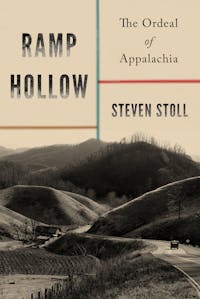Ramp Hollow
The Ordeal of Appalachia
 Download image
Download image
ISBN10: 0809080192
ISBN13: 9780809080199
Trade Paperback
432 Pages
$21.00
CA$28.00
In Ramp Hollow, Steven Stoll offers a fresh, provocative account of Appalachia, and why it matters. He begins with the earliest European settlers, whose desire for vast forests to hunt in was frustrated by absentee owners—including George Washington and other founders—who laid claim to the region. Even as Daniel Boone became famous as a backwoods hunter and guide, the economy he represented was already in peril. Within just a few decades, Appalachian hunters and farmers went from pioneers to pariahs, from heroes to hillbillies, in the national imagination, and the area was locked into an enduring association with poverty and backwardness. Stoll traces these developments with empathy and precision, examining crucial episodes such as the Whiskey Rebellion, the founding of West Virginia, and the arrival of timber and coal companies that set off a devastating “scramble for Appalachia.”
At the center of Ramp Hollow is Stoll’s sensitive portrayal of Appalachian homesteads. Perched upon ridges and tucked into hollows, they combined small-scale farming and gardening with expansive foraging and hunting, along with distilling and trading, to achieve self-sufficiency and resist the dependence on cash and credit arising elsewhere in the United States. But the industrialization of the mountains shattered the ecological balance that sustained the households. Ramp Hollow recasts the story of Appalachia as a complex struggle between mountaineers and profit-seeking forces from outside the region. Drawing powerful connections between Appalachia and other agrarian societies around the world, Stoll demonstrates the vitality of a peasant way of life that mixes farming with commerce but is not dominated by a market mind-set. His original investigation, ranging widely from history to literature, art, and economics, questions our assumptions about progress and development, and exposes the devastating legacy of dispossession and its repercussions today.
Reviews
Praise for Ramp Hollow
"Meticulously researched . . . Those who associate 'academic' with 'dry' will be pleasantly surprised: the book's prose is light and readable . . . The book's great strength is that it acknowledges something our politics often fails to: that not everyone wants the same things or possesses the same preferences . . . Challenging, interesting and engrossing."—J.D. Vance, The New York Times Book Review
Reviews from Goodreads
BOOK EXCERPTS
Read an Excerpt
1. Contemporary Ancestors
FROM DANIEL BOONE TO HILL-BILLY
In all societies there are off-casts. This impure part serves as our precursors or pioneers.
—J. Hector St. John de Crèvecoeur, Letters...



